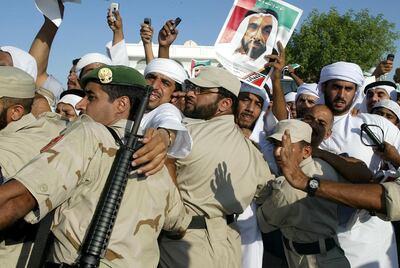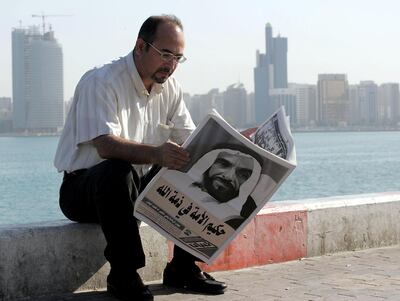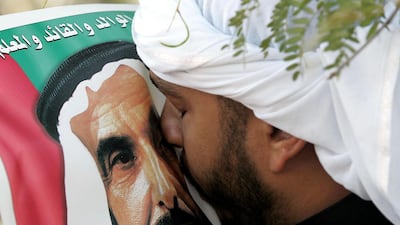It was the 19th day of Ramadan in the Islamic year 1425. Maghrib prayers were over and the fast broken. Darkness fell across the UAE, but it was nothing to compare with the dark news that would soon follow.
As it spread the country went into collective shock. Sheikh Zayed, Father of the Nation, father to all his people, had died. It was known he had been in frail health for some time but this did not lessen the blow.
“Baba Zayed” had steered the UAE from its creation in December 1971 and for the next 33 years. Now he was gone and the future suddenly seemed uncertain.
Fourteen years later those concerns are long passed. Sheikh Zayed’s eldest son, Sheikh Khalifa, continues to rule the country and the bonds that bind the seven emirates are stronger than ever.
The memories of Sheikh Zayed and the affection in which he is held, though, still hold true. There is the visible presence of the Sheikh Zayed Grand Mosque, the site of his grave, visited by thousands of all faiths and all countries every day.
This year has seen the opening of the Founder’s Memorial, a likeness of the former Ruler created as a 3D silhouette on the Corniche and the highlight so far of the Year of Zayed, which commemorates his birth in 1918 and honours his continuing legacy.
His passing was announced in the evening of what was November 2, 2004 in the Gregorian calendar. For most people, the news came on TV or radio in those Twitter-free days before social media.
Ali Khalifa, then the senior presenter for Dubai TV, recalled a stream of increasingly agitated voicemail messages left on his mobile phone telling him to return urgently to the office.
“‘Ali something big is happening’.” he recalled being told, in an interview for The National in 2011. “Nobody wanted to circulate the hard news because people did not want to believe it had happened.”
While making the announcement, Mr Khalifa was so overcome with emotion he broke down live on air. It is one of those moments that for many people define the question: “Where were you when you heard …?”
The clip can still be found on YouTube, although Mr Khalifa has said he has never been able to bring himself to watch it.
“No amount of professionalism is there to help you repress your emotions or have control over the situation,” he said.
A short statement was issued to the world by the state news agency Wam. It was simple and to the point. Sheikh Zayed had been at Al Bateen Palace when he died.
“The presidential court announces to Arab and Islamic countries and the rest of the world the death of the leader of the nation, Sheikh Zayed,” it read.
In its edition of November 3, the Arabic newspaper Aletihad observed in an editorial that: “We belong to Allah and to Allah we shall return. Zayed returns to his Creator, content and gratified.”
The funeral was held that morning, at the Sultan bin Zayed Mosque in Al Bateen. By first light, the streets around the mosque were already filling with people.
Police were soon needed to manage the crowds, many of whom held posters of the late President. They stood in silent prayer or sat on patches of grass, quiet and orderly.

Inside the mosque, Sheikh Zayed’s sons and members of his close family prayed standing over his body, which was wrapped in the flag of the UAE.
They were joined for salat al janaza, or funeral prayers, by presidents and leaders of other Islamic states, including members of the GCC, Morocco, Jordan, Iraq, Oman, Syria, Pakistan and Afghanistan.
From there, Sheikh Zayed’s remains were taken in a silver mini-van through the streets of central Abu Dhabi to the burial site on the grounds of the Grand Mosque, which was still under construction.
For the next three days, Sheikh Khalifa, as departing Crown Prince of Abu Dhabi, received condolences at Al Bateen Palace.
The presidential court proclaimed a 40-day period of national mourning, while for the next 10 days, television stations switched to a programme of Quran recitations, religious programmes and news bulletins. Government offices closed for 10 days and other businesses for three.
Beyond the UAE other tributes were paid. At the UN headquarters in Europe, flags were lowered to half-mast.
The then-president of France, Jacques Chirac, left a summit of European leaders early so that he could personally deliver his message within the time set aside for condolences.
Sheikh Zayed, Mr Chirac wrote in his message, “was the dynamic force behind the political, economic and social development of the UAE. He worked tirelessly to ensure the regional character of the UAE federation”.

Worshippers performed funeral prayers in Makkah.
The emotions set off by the death of Sheikh Zayed were a reflection of genuine affection for him in life. For many, the Ruler was not a remote figure but someone they felt they truly knew.
So many had personal anecdotes of their encounters, from street sellers to members of the expatriate community.
Akbar Khan, a seller at the souq in Mina Zayed, spoke of a visit to the area by Sheikh Zayed in the 1980s, when there were few facilities. The merchants told him it was hot and there was no running water.
"'We are poor people', we thought. 'Who would bother to build a market for us?' But Baba Zayed said he would do it for us," Mr Khan, from Balochistan, recalled in an interview with The National in 2014. "It's very rare to find a leader like him in the Muslim world."
He said that he and many other merchants from his part of the world had named their sons Zayed in the Founding Father’s honour.
Meera Al Rumaithi, from Al Ain, recalled that her own father had died a year earlier, during Eid Al Adha.
“I grieved for my father but it was when Zayed died that I said: ‘Only now the father is gone,’” Ms Al Rumaithi said.
Speaking in the year after his father’s death, Sheikh Mohammed bin Zayed, Crown Prince of Abu Dhabi and Deputy Supreme Commander of the Armed Forces, described in a TV interview “a leader who had a highly acute sense of perception in the way he went about things”.
Sheikh Mohammed remembered a visit abroad with his father when Sheikh Zayed noticed that birds looking for food gathered around a restaurant at a particular time.
“He asked to make an arrangement with the restaurant’s manager to provide the birds with enough food to satisfy their hunger,” the Crown Prince said.
“You see, the man who makes decisive, bold and tough decisions is the same tender father, the same affectionate person who has compassion for the smallest things.
“With the dawn of every new day, we wake up feeling that Sheikh Zayed is still with us. He will be remembered forever because his good deeds and great achievements are evidence of his rich legacy.”


